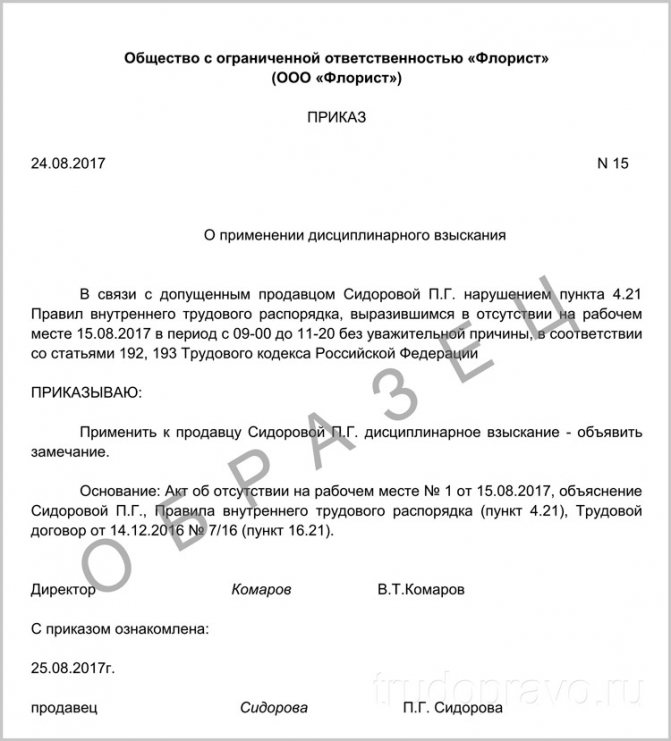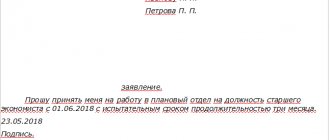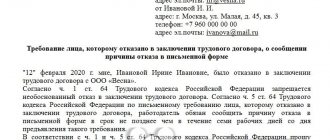Hello! In this article we will tell you everything about being late for work.
Today you will learn:
- What is considered late?
- How is being late different from absenteeism?
- What sanctions can be applied to an employee for non-compliance with labor discipline.
- Instructions for dismissing an employee for being late.
What is considered late for work?
When a person is at the workplace, he is obliged to obey the charter of the enterprise and the work schedule. An employee does not have the right to come to work whenever he wants (exception if the position provides for a flexible schedule).
Some irresponsible employees believe that being a little late will not entail any consequences. But this is a misconception. First, let's figure out what is considered late.
Lateness is the absence of an employee from the workplace for any reason from 1 minute to 4 hours.
Some managers allow employees to be late by up to 5 or 15 minutes. But this is at the discretion of the authorities. However, if such violations are systematic, then sooner or later the employer will get tired of such negligent attitude towards labor regulations.
The Labor Code says nothing about the concept of “lateness”. It is called differently - violation of discipline.
Let's look at examples of delays:
- Absence of an employee at the beginning of the working day;
- Late return of the employee from lunch break;
- Leaving the workplace on your own initiative without warning anyone;
- An employee leaving work before the end of the working day.
When hired, each employee signs an employment contract, which spells out all the rules of the enterprise and the daily work schedule.
If this agreement does not contain a clause on lateness, or the employee for some reason was not familiarized in writing with the rules of being in the workplace, he cannot be held accountable. Otherwise, he can go to court.
Failure to prove the offense
As already noted, by virtue of paragraph 53 of Resolution No. 2, in the event of legal disputes, the employer must provide evidence that the employee has committed a disciplinary offense.
What kind of evidence is this? First of all - an act of absence of the employee from the workplace, a report or memo from the immediate supervisor. In addition, written printouts from the electronic entry and exit control system and witness statements may be submitted. But that's not all.
Since being late is considered absence from the workplace during working hours, not only must the employee’s working hours be established, but evidence is required that he is familiar with this regime by signature.
Let's consider the Appeal ruling of the Sverdlovsk Regional Court dated 09/08/2016 in case No. 33-14723/2016. The employee was reprimanded twice for being late (one for 17 minutes and another for 11 minutes) and was subsequently fired. After going to court, she was reinstated. And the reason was the following.
When concluding an employment contract with the employee, structural unit *** was designated as the workplace. In section 7 of the employment contract, the parties agreed that the work and rest regime is regulated by the PVTR, clause 5.1 of which establishes that the work schedules of departments are formed taking into account their specifics by order of the employer.
The court found that the plaintiff was charged with a violation of clause 5.1 of the PVTR, expressed in being late for work by 17 minutes and 11 minutes (respectively). The grounds included a memo from the head of the pharmacy, an act of refusal to give a written explanation, and a memo from the deputy director.
Work schedules and orders for their approval are absent from the case materials, as well as other documents indicating that the plaintiff is familiar with the work and rest schedule, that is, the requirements of Part 2 of Art. 189
Labor Code of the Russian Federation.
Please note
According to Part 2 of Art. 189
According to the Labor Code of the Russian Federation, the employer is obliged, in accordance with labor legislation and other acts containing labor law norms, collective agreements, agreements, local regulations, and employment contracts, to create the conditions necessary for employees to comply with labor discipline.
Failure by the employer to comply with the conditions of clause 5.1 of the PVTR - failure to issue an order establishing the work and rest schedule, as well as failure to ensure that the employee is properly familiarized with the working and rest conditions - excludes the possibility of bringing to disciplinary liability for misconduct in accordance with the orders, since it excludes the very event of the misconduct specified in the orders.
The documents indicated as the basis in the order were also not presented.
The request for an explanatory note, sent by mail, was received by the plaintiff after the disciplinary punishment had been applied.
The repeated disciplinary action for dismissal under clause 5 of Part 1 of Art. 81 Labor Code of the Russian Federation.
Taking into account all the circumstances, the court of first instance decided that the orders to bring the employee to disciplinary liability were illegal and reinstated her, and the appellate court agreed with it.
Late for a valid reason
If you are a strict manager and notice that your subordinate is absent from the workplace, do not rush to punish him. First, you need to figure out what caused the delay, because force majeure circumstances happen in the life of any person.
Not every person can be punished for being late. Such violations are divided into lateness for a valid reason and for an unexcused one.
Valid reasons:
- Employee illness;
- Illness of his relatives and close people (for example, a child);
- Death of one of the relatives;
- Natural disasters, accidents, etc.
Any lateness for a valid reason must be documented. This could be sick leave or other medical certificates.
If you were flooded by your neighbors, then a certificate from the housing office; if you were in a car accident, a certificate from the traffic police; if the fault was due to broken public transport, a certificate from the motor vehicle transport service that services this route.
A traffic jam is not considered late for a valid reason.
Validity of the reason for being late
Since a disciplinary offense will only be lateness for an unexcused reason, if the employee proves in court that the reason was valid, disciplinary action will be considered illegal.
It should be noted that most of the delays in recent years are related to transport. And here the employer needs to decide in which cases the reason for being late is considered valid and in which it is not. It’s one thing when an employee’s road from home to work is periodically associated with traffic jams and he, knowing this, does not care and does not leave in advance, and another when force majeure occurs on the way.
Thus, the employee was brought to disciplinary liability in the form of a reprimand due to the fact that she was 37 minutes late for work due to traffic difficulties associated with an emergency situation. She appealed to the court with a demand to declare the employer’s order illegal and the court granted the claim.
The court found: according to the authorities, in the area where the plaintiff lived, there was a peak of flood waters, and therefore the introduced emergency regime limited the movement of traffic on the streets along the route from the plaintiff’s home to work, which led to the formation of numerous traffic jams due to with a limited width of the roadway and a multiple increase in traffic intensity in the specified area and adjacent areas. In addition, the delay occurred on the first working day after the plaintiff’s vacation spent abroad. The court decided that the delay was caused by objective reasons that excluded the employee’s fault. The employer's order to impose disciplinary liability was canceled (Appeal ruling of the Khabarovsk Regional Court dated June 18, 2014 in case No. 33-3573/2014).
In another decision, the court did not take into account the employee’s argument that he was late for work for valid reasons related to traffic jams: being in a traffic jam in itself is not a valid reason for being late for work; the employee is obliged to choose such a departure time for work in order to avoid being late for the start of the working day (Appeal ruling of the Moscow City Court dated 04/06/2015 No. 33-11199/15).
For your information
However, according to the decision of the Moscow City Court, the employer made another mistake and incorrectly carried out the dismissal procedure. In particular, when dismissing an employee for repeated failure to fulfill job duties without good reason in the presence of a disciplinary sanction (clause 5, part 1, article 81 of the Labor Code of the Russian Federation), the employer at the time the employee committed a disciplinary offense - being late for work for the second time - had not yet brought disciplinary liability for being late for work for the first time. The dismissal was declared illegal.
Workers being late, of course, can be caused not only by transport collapses, but also by any other reasons.
In particular, the employee was reprimanded for being an hour late. She decided to appeal the order to prosecute her in court. According to the plaintiff, her lateness was due to a longer than usual dispensary examination. At the same time, she warned her immediate supervisor about the fact and reasons for her lateness, before issuing the contested order, she gave explanations on the specified circumstances, and provided the employer with a certificate of pregnancy.
The court found that the plaintiff was indeed registered with a dispensary and was in the clinic on the direction of a doctor. In addition, it was established that she tried to call the manager and warn about being late. She did not do this the day before, because she believed that she would have time to arrive at work by the beginning of working hours. Due to the unforeseen duration of the medical examination, realizing that she did not have time to arrive at the start of working hours, she took measures to notify her immediate supervisor by phone.
As a result, the court came to the conclusion that the reason for the delay was valid and the employee was forced to be late for work due to circumstances beyond her control (Appeal ruling of the St. Petersburg City Court dated July 2, 2015 No. 33-9329/2015 in case No. 2-1751/ 2015).
The employer can assess the validity of the reason based on the employee’s explanatory note, which must be requested before applying a disciplinary sanction. If after two working days the employee has not provided the specified explanation, a corresponding act is drawn up (Part 1 of Article 193 of the Labor Code of the Russian Federation).
note
Failure by an employee to provide explanations is not an obstacle to applying disciplinary action.
What is the difference between being late and absenteeism?
Sometimes managers mistakenly assume that being late and absenteeism are the same thing. But that's not true.
Let's look at the main differences in the table.
| Criteria | Late | Absenteeism |
| Classification | Violation | Serious violation |
| Time frame | Absence of an employee from his workplace from 1 minute to 4 hours | Absence from work or absence without notifying superiors for 4 hours or more |
| Punishment | Reprimand, reprimand, dismissal (you cannot be fired for one delay) | 1 absence = dismissal |
| Where is it fixed? | In the access system (if there is one) | On the time sheet |
| Design features | An explanatory note, an act of lateness, an order for collection are drawn up | The manager has the right not to demand explanations from the violator and not to draw up any acts. He can issue an order on his own initiative and dismiss the employee |
Employer's procedure
In order to hold a citizen in legal relations with an enterprise accountable, the employer must act clearly in accordance with the established procedure in business practice. In particular, full compliance with the procedure established in stat. 193 Labor Code of Russia.
Recording lateness
The Labor Code establishes the possibility of dismissing a person only for absenteeism, but not for a delay of a few minutes - theoretically, a citizen can take advantage of this “loophole” in the law, simply by not allowing himself to be absent for more than 4 hours in a row, while doing this systematically. To avoid this, the company should act as follows:
- Drawing up by the immediate superior of an employee who is always late a memo addressed to the head of the organization, that is, proper recording of violations of internal regulations.
- Request by the employer for written explanations from the citizen.
- Making a decision on the application or non-application of a remark or reprimand on the basis of an explanatory statement about the validity or lack thereof of the reasons that led to the delay in appearing at the workplace.
- Issuance of an order imposing punishment.
- Waiting for the citizen to be late for work again.
- Recording a violation in accordance with the above procedure.
- Registration of dismissal under clause 5 of Art. 81 of the Labor Code of the Russian Federation - as for the systematic failure by the worker to fulfill his duties in accordance with the contract.
Explanation of reasons
The employer must require his employee to state in writing why the delay occurred. The worker is given exactly 2 days to submit this document (from the moment the request is submitted). If it has not been submitted, a corresponding act is drawn up. It must be signed by at least 2 employees of this enterprise.
Attention! The employer’s ability to impose an appropriate penalty – a reprimand or reprimand – does not in any way depend on the fact whether a citizen gives an explanation or not.
Registration of collection
A reprimand or reprimand is formalized by order of the head of the enterprise in which the offending person works. Compilation is carried out in free form (or on a form approved by the organization).
It is mandatory that the guilty person be notified of the appropriate sanctions within 3 working days after the order is issued. If the worker refuses to familiarize himself, then a report is drawn up.

Punishment for being late
Being late is not considered a serious violation, so punishment can only be disciplinary.
These include:
- Note – if the employee was late once;
- Reprimand – 2 or more latenesses;
- Severe reprimand – delays are systematic;
- Dismissal – regular lateness (3 times or more).
If the reason for being late was valid, and the employee has documented this, then no punishment will be imposed.
For 1 such violation, one disciplinary sanction is provided. The manager can apply punishment within 6 months after the violation. All penalties are canceled after 1 year.
If an employee has been reprimanded for a violation, the manager may remove it before the 12-month period, provided that this does not happen again.
The manager may impose a fine or reduce wages for lateness. This is contrary to the Employment Agreement. If this is allowed at an enterprise, then management may be held administratively liable.
Step-by-step instructions for dismissal for being late
According to the Labor Code of the Russian Federation, it is impossible to fire an employee for one delay. If an employee systematically violates labor discipline, the manager has the right to dismiss the negligent employee on his own initiative in accordance with Article 192 of the Labor Code of the Russian Federation.
The sequence of actions in this case is as follows:
- When the employee is late for the first time, he is obliged to write an explanatory note, where he will state the reason for his action and attach the available certificates to the document. This must be done within 48 hours.
- If within 2 days the employee does not provide the appropriate note and refuses any explanations, a Statement of Refusal of Explanations is drawn up in the presence of 3 witnesses.
- If the reason is not valid, then a lateness report is drawn up. This document must be signed by 2 witnesses who confirm the fact of the violation.
- If the violation is identified by the head of the unit, who does not have the right to impose a penalty, he writes a report addressed to his management and attaches the necessary documents.
- After this, the head of the company sets a date and time for the analysis, where all involved persons are invited.
- Based on the drawn up act and the analysis carried out, the enterprise issues an order, which will indicate the sanctions applied to the violator.
- After this, it is necessary to familiarize the employee to whom the penalty is being applied with the order. If an employee refuses to sign an order, then a corresponding act is drawn up and signed by 3 witnesses.
- The second delay is processed in the same way as the first.
- If the employee is late for the third time, the manager may fire the employee on his own initiative. In this case, the following reason should be indicated in the work book: “Systematic violation of labor discipline.”
Re-collection
So, the most suitable basis for dismissal for being late is clause 5, part 1, art. 81 of the Labor Code of the Russian Federation - repeated failure
by an employee to fulfill labor duties without good reason, if he has
a disciplinary sanction
. And here employers also commit violations.
According to clause 33 of Resolution No. 2, when resolving disputes in connection with dismissal under clause 5, part 1, art. 81
It should be taken into account that the employer has the right to terminate the employment contract on this basis, provided that a disciplinary sanction was previously applied to the employee and at the time of repeated failure to fulfill his work duties without good reason, it has not been lifted or extinguished.
One of the mandatory conditions for dismissal under clause 5, part 1, art. 81 is to comply with the procedure for bringing disciplinary action upon detection of both the first and second violations.
The dismissal is formalized by an order of dismissal for this reason; in the “Grounds” column, memos, acts and explanatory notes of the employee are indicated. The issuance of a second order to apply a disciplinary sanction in the form of dismissal in this case is not required.
The issuance of two orders - on the application of a disciplinary sanction in the form of dismissal and on the termination of an employment contract - is not a violation of labor legislation (Letter of Rostrud dated 01.06.2011 No. 1493-6-1).
An order can be issued if no more than one month has passed since the discovery of the offense. At the same time, the specified period does not include the time of illness of the employee, his stay on vacation (vacation that interrupts the monthly period includes all types of vacations provided for by law), the time provided to comply with the procedure for taking into account the reasoned opinion of the elected trade union body ( clause 34
Resolution No. 2).
Based on the order, an entry is made in the work book:
The employment contract was terminated due to the employee’s repeated failure to fulfill labor duties without good reason if he had received a disciplinary sanction, paragraph 5 of part one of Article 81 of the Labor Code of the Russian Federation.
Mistakes that managers can make when trying to quit
Before dismissing an employee, the manager must understand that violators sometimes disagree with the employer's decision. They go to defend their rights in court.
If management acted within the framework of the Labor Code, then the court will be on the side of the employer. If an employee proves the illegality of the actions committed against him, he will have to be reinstated at the enterprise.
Let's look at the main mistakes that managers make when dismissing someone for being late:
- The employee was fired after being late for 2 times, but there was no written confirmation of the first violation (it was not documented);
- The employee was late 2 times, but only one was for an unexcused reason;
- If the period between two delays was more than 12 months;
- The employer summed up all the employee’s tardiness and called this violation absenteeism;
- There were 2 violations, but no penalty was imposed for one of them.








